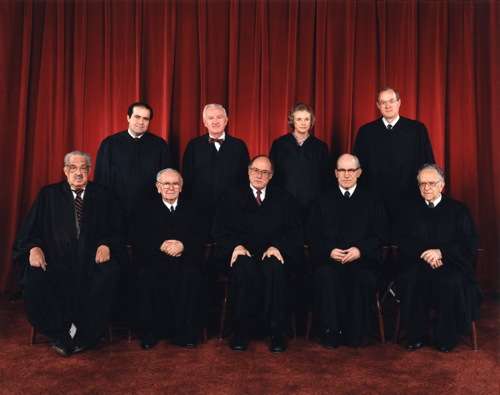The Volokh Conspiracy
Mostly law professors | Sometimes contrarian | Often libertarian | Always independent
Today in Supreme Court History: September 6, 1983
9/6/1983: The City of Richmond solicited bids for installing plumbing fixtures at the city jail. The J.A. Croson Company's bid was denied because it did not meet the "set-aside requirement" for minority contractors. The Supreme Court declared this decision unconstitutional in City of Richmond v. J.A. Croson Co. (1989).

Editor's Note: We invite comments and request that they be civil and on-topic. We do not moderate or assume any responsibility for comments, which are owned by the readers who post them. Comments do not represent the views of Reason.com or Reason Foundation. We reserve the right to delete any comment for any reason at any time. Comments may only be edited within 5 minutes of posting. Report abuses.
Please to post comments




See above
We are in a time loop Doctor!
(See preceding article)
The ruling was 6-3 with Justice Stevens concurring in part.
Stevens agreed that race-conscious programs were sometimes warranted. The fit was not adequate here. He made a few dubious assumptions, such as:
It is the judicial system, rather than the legislative process, that is best equipped to identify past wrongdoers and to fashion remedies that will create the conditions that presumably would have existed had no wrong been committed.
The 14th Amendment gives "Congress" the power to enforce the amendment. Congress has special power under the amendment. It can also delegate to the states and localities.
It is not the only one who enforces its terms. States can pass laws to protect equal protection. They did in a myriad of ways, including race-conscious programs.
Congress does have the most authority here, including because they are a national body representing the country as a whole.
After Dred Scott, it is a bit much to say the courts were given more power here. Some argue that race-conscious programs, per se, are unconstitutional.
This is not loyal to original understanding, fwiw, nor does the text compel it. The text ensures equal protection under the law. The question is how to uphold that overall.
The opposition goes into the weeds on principle and results about the problems of using race [the Equal Protection Clause is not race specific; it was especially ratified for that purpose].
Such opposition might (on some level) be convincing on policy grounds. The level of assurance required to deny popular governments to balance everything is higher.
Justice Thurgood Marshall, who knew a thing or two about how to fight racial discrimination, dissented.
There is a duplicate. Sometimes, one of them is deleted. So, I posted this in both places.
For now, I will note that I'm sympathetic to some opposition to race-conscious programs [complete opposition doesn't work imho]. OTOH, many who oppose it are not willing to do the work to use adequate alternatives. Some also look the other way or worse when other types of illicit discrimination occur, leading to some cynicism.
"...to use adequate alternatives."
And what do you think those might be?